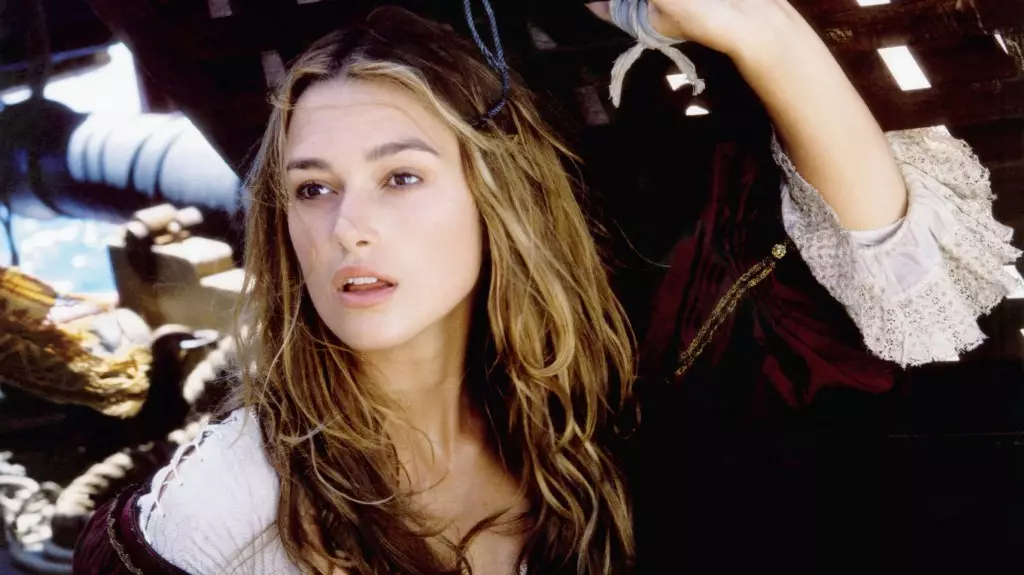Keira Knightley, a name synonymous with Hollywood’s early 2000s cinematic landscape, first captured the public’s attention as Elizabeth Swann in the iconic *Pirates of the Caribbean* franchise. Launched into the limelight at just 17, Knightley’s career soared, leading her to become a two-time Oscar nominee and a celebrated figure in the film industry. However, her meteoric rise was accompanied by a tumultuous relationship with fame that forced her to reevaluate her future in the industry. In a recent interview with The Times of London, Knightley shared her thoughts about the franchise world and the complexities of her early success.
Knightley’s reflection on her experience in the *Pirates* series reveals a deep-seated ambivalence. On one hand, these films catapulted her into a realm of opportunity, enabling her to pursue acclaimed roles in films like *Pride & Prejudice* and *The Imitation Game*, which earned her prestigious Oscar nominations. However, success came with a heavy price; Knightley candidly expressed that being associated with such blockbuster hits also subjected her to public scrutiny and criticism. She pointed out that her participation in these films created a dichotomy of admiration and disdain, stating, “I was seen as sh– because of them,” illustrating the dual nature of her public image.
Knightley’s sentiments highlight a significant aspect of celebrity culture where success can simultaneously elevate and diminish an artist. The relentless cycle of public adoration mixed with harsh critique can be overwhelming, particularly for young actors inundated with media speculation and the demands of stardom. This precarious balance straightforwardly showcases the challenges faced by artists navigating the limelight, emphasizing that the glitz and glamour often mask the emotional toll experienced behind the scenes.
In her latest reflections, Knightley firmly positioned herself against returning to franchise filmmaking. Expressing the strenuous nature of blockbuster commitments, she declared that the “hours are insane,” pointing to the considerable sacrifices required in terms of time and personal freedom. Hollywood tentpoles often dictate the artist’s schedule, demanding extensive periods of filming under unpredictable conditions. This realization has prompted Knightley to seek a more autonomous path in her career, valuing her well-being and family life over the constraints imposed by high-stakes franchises.
Since transitioning into a different phase of her life, particularly after becoming a mother, Knightley has prioritized more intimate, diverse projects that allow her to explore character depth and complexity without the overwhelming pressure of franchise expectations. This strategic shift underscores the importance of artistic choice and personal boundaries, revealing how actors can reclaim their narratives in an industry rife with demand.
Knightley’s exploration of her early struggles with fame is crucial in understanding the broader context of mental health in Hollywood. As someone who rose to prominence during a time when discussions surrounding mental health and body image were often stigmatized or neglected, Knightley’s experiences resonate with many current and aspiring actors. She shared poignant thoughts about the public’s speculation regarding her physical appearance, particularly when tabloids circulated assumptions about her health. “I knew I wasn’t,” Knightley noted, referring to the scrutiny she faced concerning her body. Such experiences reveal the damaging nature of public perception and the mental toll it can take on individuals who are constantly in the public eye.
Moreover, Knightley’s recollections of her “bodily memory” offer a glimpse into the profound effects of trauma, public shaming, and emotional turmoil that can befall young actresses. By bravely speaking out about these issues, Knightley contributes to a vital conversation about the need for compassion and understanding within the entertainment industry—a conversation long overdue.
As Knightley transitions into this new phase of her career, she is set to star in Netflix’s upcoming series *Black Doves*, alongside Ben Whishaw. Scheduled for release on December 5, this project marks a return to the screen that aligns with her artistic vision, free from the constraints of her previous franchise roles. By embracing this opportunity, Knightley reaffirms her commitment to navigating her career with intention, prioritizing both her well-being and her evolving identity as an artist.
Overall, Keira Knightley’s journey encapsulates the complexities of fame, resilience, and personal growth. As she carves out a less conventional path in Hollywood, her story serves as an inspiration for others grappling with similar challenges, offering a hopeful reminder that reinvention and self-empowerment are attainable, even in the industry’s often unforgiving landscape.


Leave a Reply